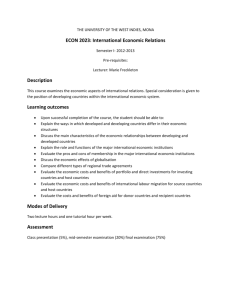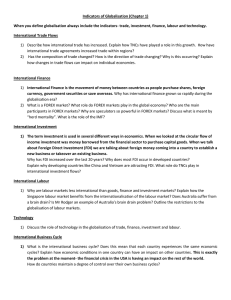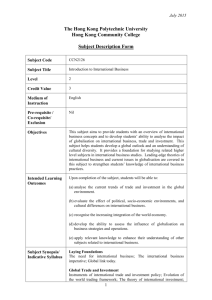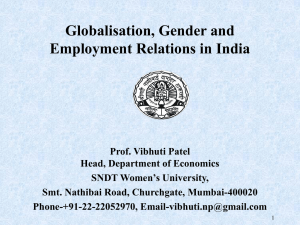Learning unit 1 Session 1-12
advertisement
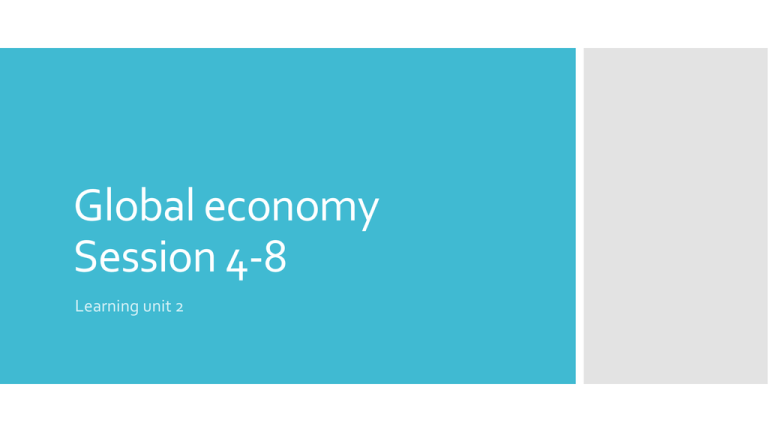
Global economy Session 4-8 Learning unit 2 MO2 Module outcome covered Evaluate the role and impact of media and new communication technology in a globalised world. MO4 Differentiate between media communication practices in South Africa and abroad. MO5 Analyse the impact of global communication on various socioeconomic and technological environments Learning Content: Global economy and division of labour and their relevance to global communication. Electronic imperialism. Transborder data flow with reference to free trade. Explain the concept “global economy”. Learning Objectives: Explain what is meant by “division of labour” and its role in the global economy. Define “electronic imperialism”. Explain the term “Transborder data flow”. Use a local example to enhance your answer. Discuss why developing countries are wary of both free trade and free flow of communication. Explain the US-centric notion of the Internet Material to be used : Prescribed text pp.39-54. Additional notes are given in the Introduction to this Learning Unit to supplement the prescribed textbook. Pages to focus on: pp.39-42, 46-52. How to prepare for this Learning Unit: Before the first class, be sure that you read Sections 1-4 of this Learning Unit, and pp.39-53 in the textbook. As you read these sections, see if you can find the answers to the following questions: How was the pre-modern world different to the modern world in terms of the division of labour? What is your view of the dominance the US has over the world in terms of global media flow? What are the merits of free trade? Does South Africa engage in free trade, and if so on what levels? Are there any specific restrictions? Recommende d Additional Reading . Giddens, A. 2001. Sociology. 4th edition. Cambridge: Polity Press. Recommende d Digital Engagement and Activities http://www.economist.com/blogs/dailychart/2011/08/apple-andsamsungs-symbiotic-relationship Explain the concept “global economy” The world economy, or global economy, the economy, which is based on economies of all of the world's countries' national economies global economy The system of industry and trade around the world that has developed as the result of globalization (= the way in which economies have been developing to operate together as one system): Reflect on how the global economy has affected you personally. Where was your textbook published? Where do your clothes and shoes come from? Where were your laptop, tablet and/or cellular phone made? Is your favourite food dish (e.g. sushi, Chinese or Italian) originally from a different country? This learning unit introduces you to the concept of the global economy and shows how the Industrial Revolution sparked global communication as we know it today. Price of oil, international brands The international spread of capitalism, especially in recent decades, across national boundaries and with minimal restrictions by governments. The global economy has become hotly controversial. Critics allege that its props, free markets and free trade, take jobs away from well-paid workers in the wealthy nations while creating sweatshops in the poor ones. Its supporters insist that the free movement of capital stimulates investment in poor nations and creates jobs in them. Division of labour Explain what is meant by “division of labour” and its role in the global economy. Developed out of the Industrial Revolution. It refers to the process whereby cooperating people that are working for the same company or towards the same goal perform various, but specific tasks and fulfil certain roles (Kamalipour, 2007, p. 40). enhances productivity; As a result of the development of the division of labour, production of goods (or provision of services) became quicker and cheaper. Individuals were also able to concentrate on their task and in so doing, build up their expertise, which in itself would increase overall output There are a few disadvantages that developed . interdependencies, thus if just one individual performs poorly, the entire production process will be adversely affected. PROBLEMS Coordination and control are thus vital managerial skills that have to be constantly monitored. . While it may have been a simple process to coordinate and control workers within a small factory during the 13th century, since then companies have become multinationals and the task of monitoring and controlling employees around the world becomes a very difficult managerial one. Companies going global –goods could be made at a lower cost in other countries, therefore workers would be in a constant state of anxiety over the security of the job for fear of being replaced by another worker in a another country, so as to save the company money and increase profits (Kamalipour, 2007, p. 41) . These days, division of labour has even spilled over beyond national boundaries. Link to global economy? By way of an example, according to the Economist blog (The Economist, 2011), an Apple iPhone is made up of components that are manufactured in over 5 countries, and interestingly, its rival Samsung, plays a pivotal role in the manufacturing of the iPhone. Whereas global trade in the past was limited to lightweight items, today tons of steel, oil, grain, and other commodities are routinely moved across the world. These movements affect not only the consumption of luxuries by the wealthy, as in the past, but also the consumption of everyday items by the common people (Kamalipour, 2007, p. 42). Define “electronic imperialism”-GLOBAL MEDIA FLOW . roots in imperialism dating back to World War II. electronic imperialism Many scholars argue that although the formal empires have been dissolved, the global political structures created during the age of imperialism remain in place (Kamalipour, 2007, p. 46). These structures create a relationship of dependency between the rich and poor countries. Electronic imperialism refers to the fact that developed countries still have the upper hand over developing countries in many regards, but specifically with regards to electronic communication such as television and the Internet. The US overwhelmingly dominates the cinema and television screens all over the world economic power and spreading its culture across borders. No other country even comes near the US presence on the world’s electronic entertainment stage. New Information Order NWIO- encourages regulation of information by governments however technology is now making it difficult. Explain the term “Transborder data flow”. Use a local example to enhance your answer. Transborder data flow Refers to the sharing of data or information across national borders (Kamalipour, 2007, p. 48), is probably a new concept to you so make sure you familiarise yourself with this notion and ensure that you can comment on South African examples to further your knowledge. The terms “free trade” and “free flow of communication” are also important in this regard. Purpose: The purpose of this task is for you to gain a better understanding of the term “transborder data flow” and do some research in terms of where South Africa is with regards to sending and receiving information on a global scale. Activity 1 Task: Within groups of about 4-5 people, work through the section “transborder data flow” (Kamalipour, 2007, p. 48) in your textbook. Then, doing some online research, gather information on where South Africa can be positioned in terms of the flow of global communication from and to our country. Emerging network structures Read page 52 on emerging network Izimvo Exchange Discuss why developing countries are wary of both free trade and free flow of communication. Explain the US-centric notion of the Internet page 46-47 and 52 Internet Basically the US-centric nature of the Internet suggests that the United States overwhelmingly dominates the Internet in terms of the sheer number of American websites and Internet hosts available. The global Internet exhibits a centre-periphery relationship similar to how African telephone networks work An email from Stockholm to London goes via the United States even though the direct physical distance between them is shorter. The US-centric nature of the global Internet is also evident in the financial arrangements for international circuits (Kamalipour, 2007, p. 52). Unlike the telephone system, in which the cost of the international circuit connecting the two countries is evenly split between them, Internet service providers (ISPs) in other countries pay the entire cost of the circuit connecting them to the US. The US carriers are able to get away with this because of their leverage with overseas ISPs The ISPs are willing to pay for the entire circuit because they need access to US websites and exchange points that can connect them to other countries. Izimvo Exchange Working within groups, discuss the merits of globalisation. Is globalisation something that has helped South Africa in terms of development, or is it a process that has done more harm than good? Give specific examples of both the positive and negative consequences of globalisation on South Africa. The positive frame; points to the potential gains and benefits of globalisation. . The negative frame; Globalization Frame points out the increasing potential for economic crisis, the threat to the livelihoods of workers, and the growing income inequality caused by globalisation. This frame also includes discourse (1) which is primarily concerned with the negative impact of globalisation in the Third World. The neutral frame; portrays globalisation as a natural , evolutionary, and largely inevitable development. This discourse, which is associated with the financial community, avoids making moral judgments The constructive frame. The constructive frame is an emerging frame that is more positive and constructive than the negative frame. This discourse supports global cooperation and interaction while opposing some of the negative effects of globalisation. As a class, debate the merits of free trade. As part of your discussion, incorporate South Africa’s position on free trade. Also incorporate your view on how free trade has impacted on South Africa in terms of the global economy.
